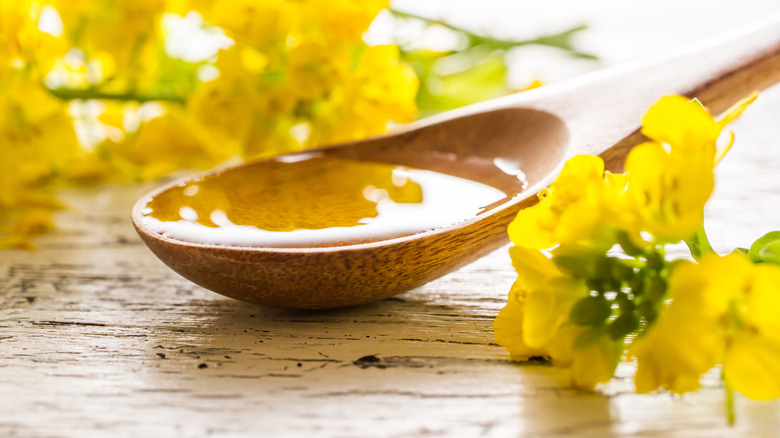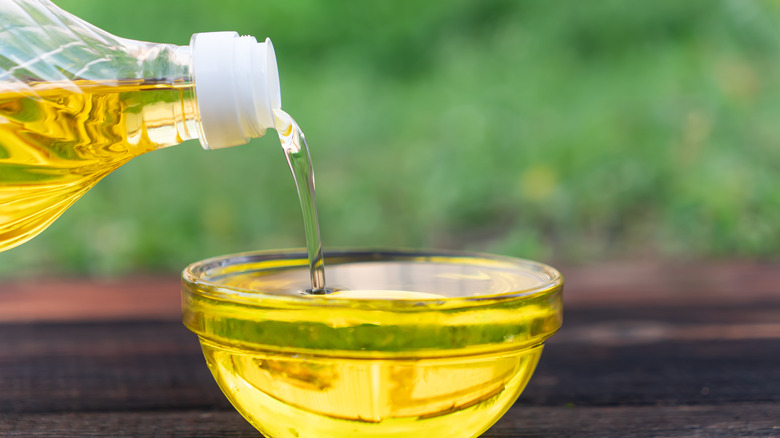Canola Vs Olive Oil? Bobby Flay Has A Clear Favorite
The debate over which cooking oil showcases the best performance and versatility is a divisive topic among pro chefs. For some, olive remains the go-to choice for just about anything — though its slightly lower smoke point of around 350 degrees Fahrenheit can limit it. Plenty of other cooks have switched to avocado for baking, searing, and frying. The world-renowned Bobby Flay has even weighed in on his favorite oil, but his answer is decidedly unfancy — he always reaches for canola.
In a 2014 interview with Bon Appétit, the professional chef estimated that he uses canola oil for 98% of his recipes, due to its neutral, versatile flavor and high smoke point. It can withstand temperatures up to 400 degrees Fahrenheit and has an undetectable taste that won't distract from other ingredients. This makes it one of the best high-heat oils for sauteeing, as it can withstand the searing conditions of your stovetop, as well as the oven, grill, and pretty much any other appliance.
Flay, indeed, calls for canola oil in a wide range of his recipes, including pan-seared burgers and penne with basil and tomatoes. The oil can get hot enough to form a great crust on burgers without smoking or burning. It has plenty of uses in uncooked applications and even desserts as well.
Canola versus olive oil
While there are plenty of health misconceptions about canola, most of them are largely unfounded. For example, many people like to cite that this cooking agent has a lot of omega-6 fatty acids, which were thought to cause inflammation. Per a 2011 study for Nutrition & Metabolism, increased consumption of linoleic acid (common in canola oil) does not actually increase arachidonic acid, which is a leading cause of inflammation. In fact, omega-6s have actually been shown to decrease bad cholesterol and stabilize blood sugar levels (via Harvard Health Publishing).
Unlike most cooking oils, canola also has a fair amount of omega-3 fatty acids, which can lower the risk of cardiovascular conditions such as high blood pressure (per Forbes). Olive does have a much higher level of antioxidants (especially if you're purchasing extra-virgin — EVOO), but canola has less saturated fat per tablespoon.
Canola and olive oil may also be used interchangeably, but there are a few more exceptions. Frying or grilling with the latter at high temperatures might just be one of the biggest mistakes you should avoid, as it can lead to nasty burned flavors. On the other hand, you never want to use canola as a replacement for uncooked EVOO, as it does not have those grassy overtones that make it excellent for bread dips and vinaigrettes. Bobby Flay doesn't use canola all the time, so feel free to change things up.
Tips for using and storing canola oil
Outside of your favorite Bobby Flay specials, canola oil can be used in a variety of recipes that don't just require searing temperatures. For example, mix it with some seasonings and red wine vinegar to make a simple salad dressing or incorporate it into the batter of a vibrant red velvet cake. Canola oil is also one of the main ingredients for making homemade margarine, another cooking agent that closely resembles butter in texture but has no animal products.
Canola also makes a great replacement for vegetable oil, as they both feature a relatively mild taste and high smoke points. The two do have slightly contrasting flavors, but they are so mellow that you are likely not going to notice them unless you're consuming them in isolation. Vegetable oil also has a higher smoke point than canola, so you'll want to use it for any recipe that calls for temperatures above 400 degrees Fahrenheit.
Lastly, you'll want to put away your canola in the pantry for a few reasons. Like any other oil, heat, light, and exposure to air can accelerate the spoilage process, which can create unsavory odors and flavors. Once properly stored, the U.S. Department of Agriculture's FoodKeeper app recommends finishing your canola oil within a year.



